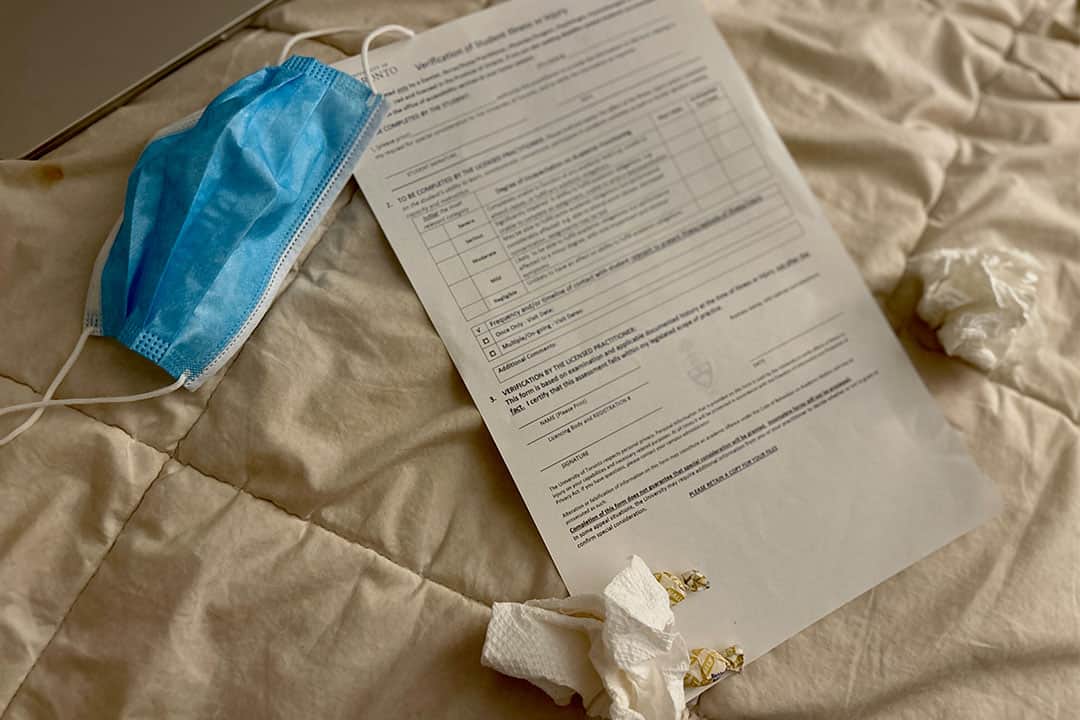As we enter November, you may have noticed the leaves turning red, cafés using more pumpkin spice, and the weather getting colder.
You may also have noticed the people around you getting sick. Unfortunately, the flu season is here — and it is here to stay until the spring.
What is the flu?
The flu is a viral respiratory illness caused by the influenza virus. Its symptoms include fevers, chills, coughing, a sore throat, a runny or stuffy nose, muscle or body aches, headaches, and tiredness. Often confused with the cold, symptoms of the latter are usually milder than the flu symptoms and generally do not result in serious health problems.
In an email to The Varsity, infectious disease clinician scientist and U of T Professor Rupert Kaul explained that the most commonly infectious illnesses on campus are spread through one of three ways: the respiratory tract, food, or sex.
“In the winter and early spring months there is always an increase in the rates of several respiratory infections on campus and in the rest of Canadian society: these infections include influenza, RSV [respiratory syncytial virus], COVID and 4 other seasonal coronaviruses,” he wrote.
While influenza viruses spread year-round, we are more susceptible to getting the flu in the winter because of increased time spent in indoor spaces and the lack of sunlight, which leads to lower levels of vitamin D and melatonin, ultimately compromising our immune systems.
Although the average university student is at an age where their immune system is functioning at its prime, we should still take the flu season seriously. Getting sick with influenza puts you at risk of other infections — including viral or bacterial pneumonia, which affects the lungs. Influenza also increases the risk of complications that can be life-threatening for individuals with chronic medical conditions such as asthma, diabetes, or heart disease.
U of T’s policies and accommodations
U of T provides accommodations to students in cases where they get the flu. If students miss an academic obligation and wish to seek academic consideration as the result of the flu, students can either declare an absence using the Absence Declaration Tool on ACORN.
Students are, however, limited to one absence declaration per academic term. For absences extending beyond the seven-day period, students must submit a Verification of Student Illness or Injury form — paperwork from a medical professional confirming your illness — and contact their registrar’s office on top of declaring their absence on ACORN. Some divisions have their own procedures outside the Absence Declaration Tool for absence reporting or seeking academic consideration.
The bottom line? The Absence Declaration Tool on ACORN is your friend, and you should declare your absence if your illness will prevent you from submitting work.
Lifestyle habits
Protect yourself against the flu in the first place with good personal hygiene and lifestyle habits. While we are all familiar with the 20-second rule for handwashing and etiquette like sneezing into the bend of the arm, we should be mindful that self-care plays an equally important role in boosting our immunity.
If students are struggling mentally or physically, the Health and Wellness Centre at the university provides skills-building workshops and group therapy to help students develop better coping mechanisms and time management skills.
Getting vaccinated
Finally, since flu viruses can change over time and the flu shot’s effectiveness can decrease, it is essential to get your flu shots every year.
Given that COVID-19 is still circulating across Canada, medical experts in a recent Chatelaine article said “Canadians ages five and up should receive an updated COVID-19 vaccine dose — even if they have previously been vaccinated” — along with a flu shot.
During flu season, you can get a free flu and COVID-19 shot from your doctor or nurse practitioner; participating pharmacies like Rexall, Shoppers Drug Mart, Loblaw Pharmacy; and some public health units.
Editor’s Note (November 30, 2023): this article previously stated that students experiencing short-term illnesses like the flu can request academic accommodations with Accessibility Services. The article has been updated to reflect the fact that such accommodations are only for students who have a documented need due to disability.



No comments to display.